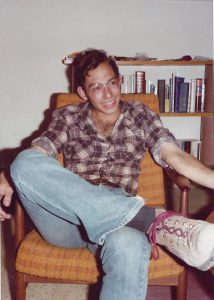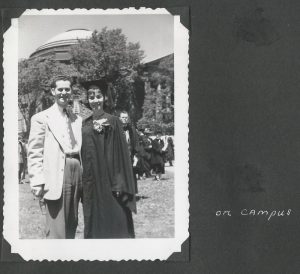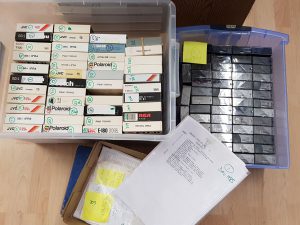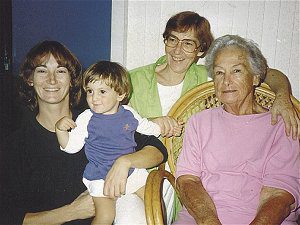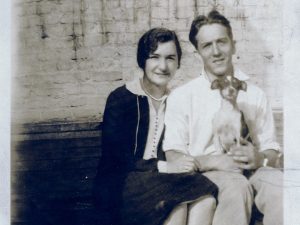Instagram à la 1950
My Video Nostalgia Project
Truths My Mother Taught Me
The Courtship of Ruth Radman and Leonard Meyer
Bittersweet Serendipity While Cycling Near Shaar Hagai
Shana Tova to the Wonderful Women in My Life
In Memory of Joe Benadon
ג’ו, תסלח לי על כך שלא באתי לבקר אותך במשך כל החודשים הארוכים שבהם שכבת בביה”ח הרצוג. לאחר הביקור הראשון הרגשתי שאינני רוצה לזכור אותך כך. העדפתי לזכור את הבן אדם שהיית פעם – מוכשר, יצירתי, עליז, מצחיק, ומלא חיים.
בזכות הקשר המשפחתי והחברי של רעיה ויובל, אני זכיתי לבלות במחיצתך גם באירועים משפחתיים וגם בבילויים של סתם כיף.
כיצד אני זוכרת את ג’ו? שבת בבוקר. יום יפה. מרימים טלפון למשפחת בן-אדון ומזמינים לבקרבקיו בחצר אצלנו במכבים. לרעיה קצת קשה להיכנס לפעולה בשבת. אך ג’ו, בהתראה קצרה, מקים, מתניע ומוציא את כולם לדרך. עוצרים באבו גוש לקנות פיתות, חומוס וטחינה גולמי. מגיעים למכבים וג’ו ישר נכנס איתי למטבח ותופס פיקוד. הוא תוקף וחותך את הירקות ויוצר סלט עשיר וטעים. ואז הוא ניגש להכין את הטחינה – המומחיות שלו – עם חבילה שלמה של פטרוזליה טריה ולימונים שאני דואגת לספק. הבראוניס שבתנור לקינוח מעלים ריח של שוקולד. יובל ורעיה בחוץ. יובל מטפל בבשר על הגריל ורעיה בתנוחת מנוחה ליד השולחן.
הילדים שלנו תמיד אוהבים את המפגשים האלו. הם נצמדים לשולחן האוכל, מרותקים וצוחקים מהסיפורים והבדיחות של ג’ו. תמיד הוא מגיע עם רעיון לפטנט ומתיעץ עם יובל המהנדס כיצד ניתן להפוך את הרעיון לדבר עובד. פעם הוא מחפש דרך לבנות מוצג לתערוכה. פעם הוא מתאר מוצר שהוא רוצה לייצר ולשווק. ופעמים רבות הוא מספר סיפורים מהחיים שקשה להאמין שהם לא בדויים. כמו הסיפור על איך שפעם קשר רגליהם של זבובים עם שערות ראשו. וכדי להוכיח שהדבר אשפרי, הוא מניף יד, תופס זבוב ומשחזר את הניסוי, לתדהמת הסובבים אותו. ואני במיוחד אוהבת וזוכרת את הסיפור הסודי על הצ’ופצ’יק של הקומקום של בן-גוריון.
My War Experience (Second Lebanon War)
After 30+ years of living in Israel without being closely touched by the hostilities and violence that so frequently affects lives here, I experienced first-hand the loss of a friend’s child, who was killed on the first day of the war.
I cannot truly sense what it was like to be a resident of northern Israel this past month. To live in fear of a rocket hitting my home, my yard, my office, my car, or my neighborhood schools and stores. To keep a handbag and essentials constantly at hand, ready to grab and run down to the shelter the moment the siren wails warning of an imminent rocket attack. To evacuate to another town in the center or south of the country, where family and friends would put me up indefinitely. This was not my “war experience.”
I spent this past month living in another fear. The dread of a phone call, or a friend at work, and even my own son Doron, telling me that the son of a friend or neighbor had been killed in Lebanon. My personal horror began the day the war began. I had just returned home from work that Wednesday, July 12, when a friend called and asked, “Are you sitting down? She repeated her question again, “Are you sitting down?” My heart began to pound. “Carleen’s son Yaniv,” she said, “He was killed in the tank that was exploded this morning.” I started to shake. I felt as if a knife had been plunged into my brain. I broke down and cried.
Dvar Torah: Pinchas – in memory of St. Sgt. Yaniv Bar-On
In mid-July 2006, Congregation Shalhevet Hamaccabim was planning to hold its annual special kabbalat shabbat service honoring our recent high school graduates, soon-to-be army inductees. Like Carleen and Asher Bar-on, I have a daughter who was about to begin her army service. In honor of the occasion I volunteered to deliver the d’var torah — something I had never done before. I chose a theme that was appropriate for our soon-to-be soldiers, and had already prepared my text when we learned that the Bar-on’s middle child, Yaniv, had been killed on the Lebanese border. By Friday I had rewritten the ending, and my d’var torah became a message to a kehila in mourning. I delivered the d’var torah again (in English) at an evening service during Yaniv’s shiva.
D’var Torah, in memory of St. Sgt. Yaniv Bar-On, of blessed memory
This week’s Torah portion, Pinchas, relates an important event in the history of the people of Israel – the chosing of Yehoshua to succeed Moshe as the people’s new leader.
The Israelites are encamped at Shittim. They are soon going to enter into the promised land. But as we know, Moshe will not be leading the people. The time has come for a new leader.
ַיֹּאמֶר יְהוָה אֶל-מֹשֶׁה, עֲלֵה אֶל-הַר הָעֲבָרִים הַזֶּה; וּרְאֵה, אֶת-הָאָרֶץ, אֲשֶׁר נָתַתִּי, לִבְנֵי יִשְׂרָאֵל. וְרָאִיתָה אֹתָהּ, וְנֶאֱסַפְתָּ אֶל-עַמֶּיךָ גַּם-אָתָּה, כַּאֲשֶׁר נֶאֱסַף, אַהֲרֹן אָחִיךָ.
God tells Moshe to go up the mountain and look upon the land, which He is giving to the people of Israel. God reminds Moshe that he will die, like his brother Aharon, before he enters the land.
וַיְדַבֵּר מֹשֶׁה, אֶל-יְהוָה לֵאמֹר.
יִפְקֹד יְהוָה, אֱלֹהֵי הָרוּחֹת לְכָל-בָּשָׂר, אִישׁ, עַל-הָעֵדָה
Moshe, a true and great leader, does not argue with God. He does not focus on his own fate. Instead his concern is to make sure that the Jews will still have someone to lead them after he is gone. He asks God to select a worthy leader for the people, one who will lead them like a shepherd.
And who does God select?
וַיֹּאמֶר יְהוָה אֶל-מֹשֶׁה, קַח-לְךָ אֶת-יְהוֹשֻׁעַ בִּן-נוּן–אִישׁ, אֲשֶׁר-רוּחַ בּוֹ; וְסָמַכְתָּ אֶת-יָדְךָ, עָלָיו.
Why is Yehoshua selected? Because “he is a man in whom there is spirit.”
That sounds like a very small requirement for someone who is about to assume such an important role as leader of the Jewish people.
